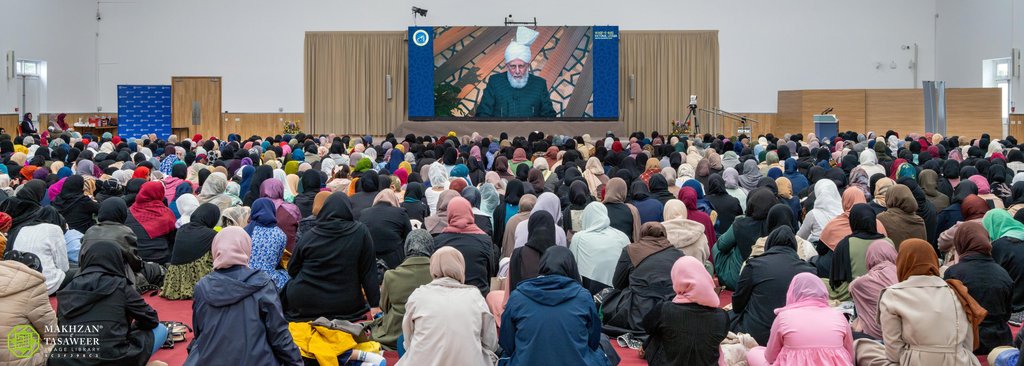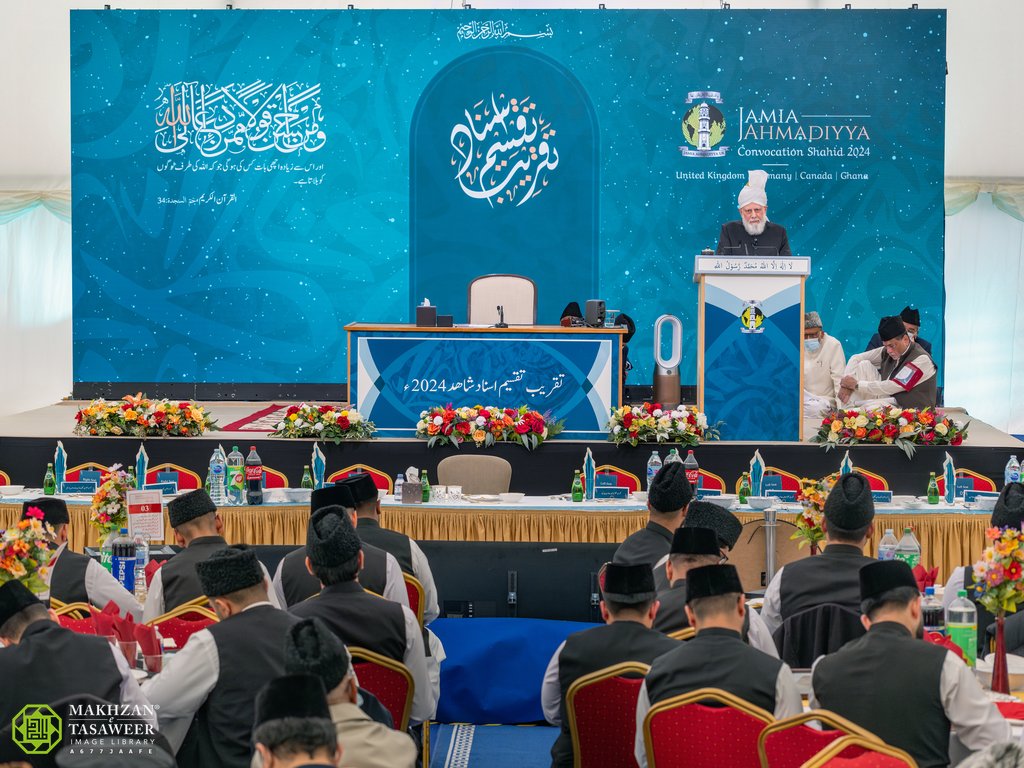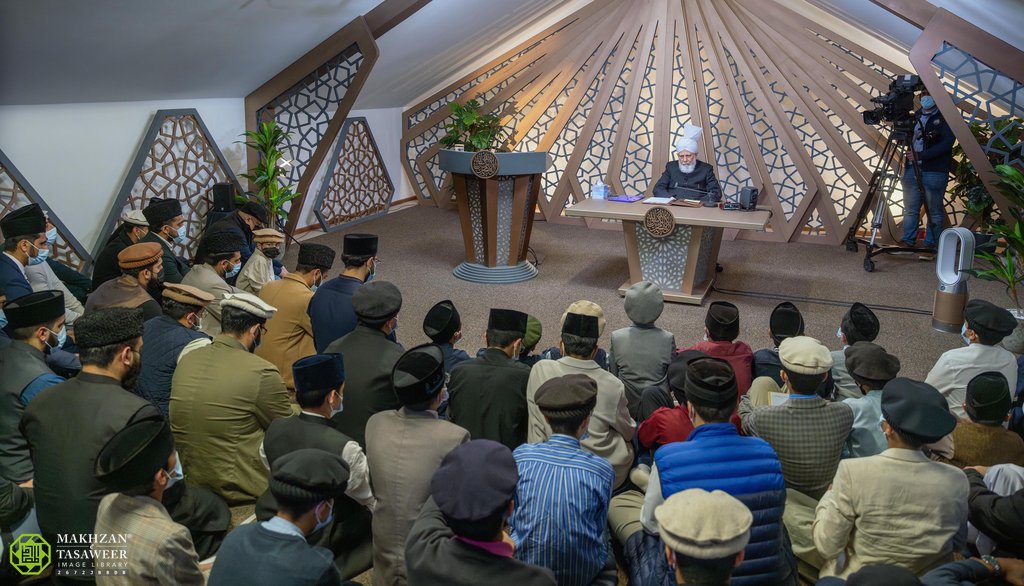
Head of Ahmadiyya Muslim Community Encourages Waqf-e-Nau to Emulate the Example of Prophet Abraham
“As Waqf-e-Nau, you are tasked with bringing about a spiritual and moral revolution in the world. Most certainly, with the Help of Allah, you can achieve this, but only if you faithfully uphold upon your pledge to spread the beautiful teachings of Islam around the world” – Hazrat Mirza Masroor Ahmad
On 27 April 2025, the World Head of the Ahmadiyya Muslim Community, the Fifth Khalifa (Caliph), His Holiness, Hazrat Mirza Masroor Ahmad addressed the concluding session of the UK National Waqf-e-Nau Ijtema, an annual gathering held for male members of the Ahmadiyya Muslim Community in the UK who have pledged their lives for the peaceful service of Islam.
His Holiness graced the event from the MTA Studios in Islamabad whilst more than 2070 men and boys, including 1650 members of the Waqf-e-Nau scheme gathered at the Baitul Futuh Mosque in London.
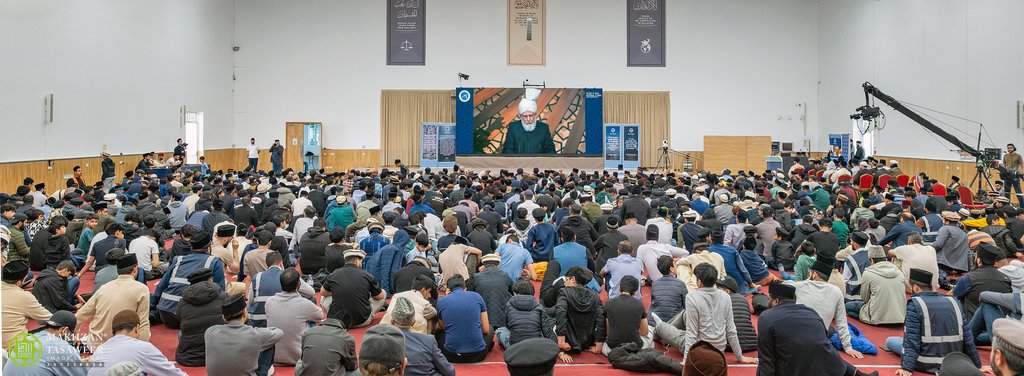
His Holiness began the keynote address by outlining how Waqf-e-Nau members, i.e., those who have devoted their lives to their faith, can best fulfil their responsibilities, stressing that their pledge demands sincere service to their faith and prioritising spiritual and moral development over worldly pursuits.
Hazrat Mirza Masroor Ahmad said:
“Your pledge requires you to sincerely serve the Ahmadiyya Muslim Community in whatever way or capacity is needed. It requires that even if you are working externally, you should ensure that, alongside your worldly employment, you dedicate ample time and effort to fulfilling the needs of the Ahmadiyya Muslim Community and your own spiritual development. So, those Waqifeen-e-Nau who are now pursuing a worldly profession should not just focus on earning money or career advancement. Instead, their priority should be to improve their spiritual and moral standards.”
Subsequently, His Holiness drew attention to the profound guidance of the Promised Messiah (peace be upon him), who taught that true devotion requires a believer not only to proclaim, as Prophet Abraham (peace be upon him) did, “I have submitted to the Lord of the worlds” (Holy Quran: Chapter 2, Verse 132), but also to prove that devotion through their actions.
His Holiness reminded the Waqf-e-Nau members of the importance of constantly evaluating their commitment to the pledge they have made. His Holiness emphasised that fulfilling the demands of their pledge requires both spiritual dedication and a sincere effort to serve the Ahmadiyya Muslim Community.
Hazrat Mirza Masroor Ahmad said:
“Your hearts should remain ever vigilant and restless about whether you are meeting the demands of your pledge. Only when you become obedient to Allah for His sake alone will you fulfil the rights of His worship. Then, instead of offering Salat [five daily prayers] in a hurried way, you will offer your prayers with complete concentration, humility and sincerity. Similarly, you will recite the Holy Qur’an daily and act upon its commands. You will strive to increase your religious knowledge by reading the literature of the Ahmadiyya Muslim Community, especially the books of the Promised Messiah (peace be upon him). Only then will you be fulfilling the rights and demands of your Waqf. Only then shall your Waqf (devotion to faith) prove a means of self-reformation. Only then will you be able to be successful in spreading Islam’s teachings around the world.”
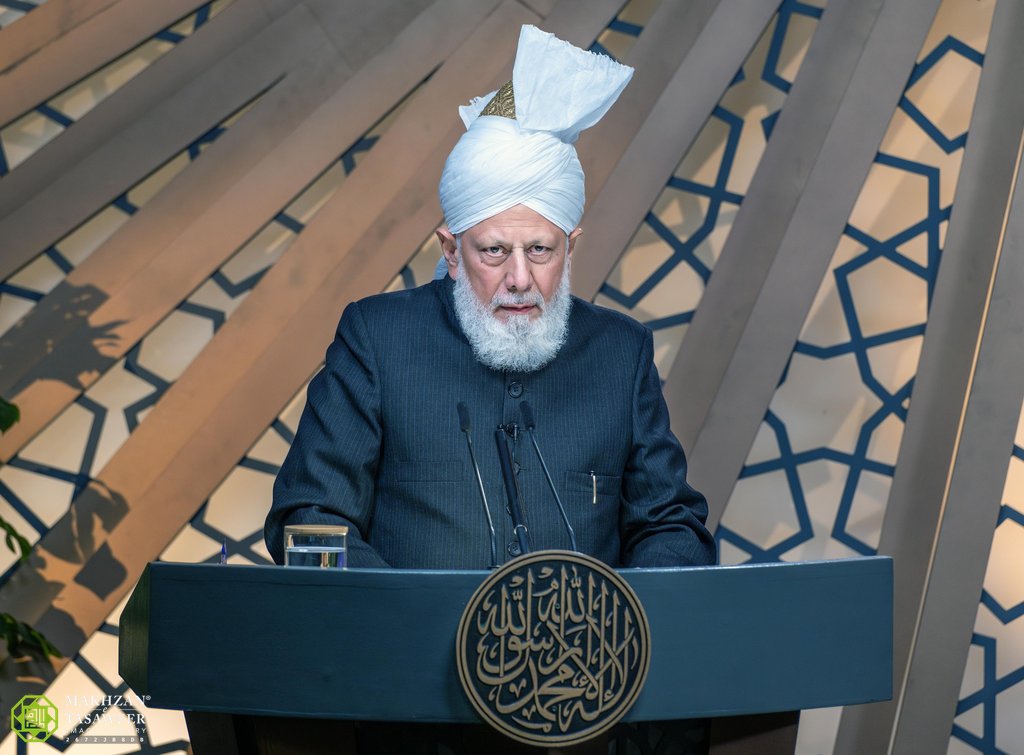
During the address, His Holiness highlighted the troubling state of the world and said that if the Waqf-e-Nau members are “united in purpose” and make every possible sacrifice for the peaceful service of Islam, the world will witness a “glorious moral and spiritual transformation.”
Highlighting the lack of peace and justice in the world, Hazrat Mirza Masroor Ahmad said:
“Across the globe, humanity has become shackled by the heavy chains of material desires and the deceptive shimmer and shine of worldly attractions. Immorality, depravity and corruption have plagued modern-day society. Furthermore, the peace and security of the world has been shattered. Both internally within many nations and internationally, a raging inferno of jealousy, hatred and enmity burns incessantly. Tragically, innocent souls are being massacred in wars and conflicts that have no basis in justice and are being fought only to serve the selfish and malevolent agendas of the rich and powerful.”
Addressing the Waqf-e-Nau, His Holiness said that in such circumstances, “you must never underestimate your true potential and mission”.
Hazrat Mirza Masroor Ahmad said:
“As Waqf-e-Nau, you are tasked with bringing about a spiritual and moral revolution in the world. Most certainly, with the Help of Allah, you can achieve this, but only if you faithfully uphold upon your pledge to spread the beautiful teachings of Islam around the world.”
His Holiness referred to the Promised Messiah (peace be upon him), who highlighted the praise of Prophet Abraham (peace be upon him) in chapter 53 verse 38 of the Holy Qur’an, which states:
“And of Abraham who fulfilled the Divine commandments.”
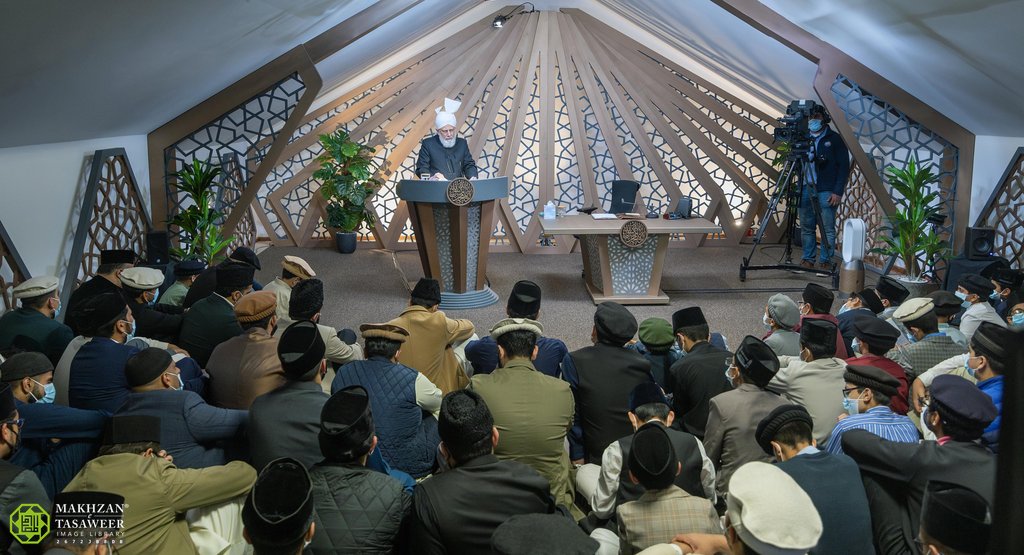
His Holiness explained that this verse highlights how Prophet Abraham (peace be upon him) faithfully upheld his covenant with Allah, enduring trials with patience and unwavering loyalty. He emphasised that this example is an inspiration for all who dedicate their lives to their faith, showing the standard of submission and faith required.
Hazrat Mirza Masroor Ahmad said:
“The obedience of Prophet Abraham (peace be upon him) is not merely a story for us to narrate and appreciate. Rather, it should serve as an inspiration to every one of you. Indeed, you should consider it a personal instruction demonstrating the standard of submission and unwavering faith demanded of those who dedicate their lives to their faith. Only if you seek to emulate and manifest such complete fidelity to Allah can you do justice to your pledge. Otherwise, the covenant and promise you have made to Allah the Almighty shall be meaningless.”
His Holiness outlined the standards of faith and obedience required of all Waqifeen, stressing that true devotion goes beyond words.
Hazrat Mirza Masroor Ahmad said:
“True faith and loyalty to Allah can never be limited to words. Instead, it requires a person to vanquish his personal desires. It requires a form of death, in which a person suppresses his ego and personal desires to such an extent that they no longer exist. It requires that a person’s every breath and movement is governed solely by a desire to follow the commands of God Almighty. It requires a person to forsake all the pleasures and attractions of the world. It requires a person to patiently endure every possible form of humiliation, hardship and struggle for the sake of God. And it requires a person to tolerate every type of pain and suffering for the sake of attaining Allah’s pleasure. Only if a person achieves this state can he be considered to have lived up to his pledge of devoting his life to the service of God.”
Furthermore, His Holiness emphasised a crucial aspect of fulfiling the Waqf-e-Nau pledge: the rejection of all forms of idol worship. While many associate idol-worship with the worship of physical idols or deities, His Holiness, in light of the writings of the Promised Messiah (peace be upon him), clarified that idol worship extends beyond such obvious practices. It includes anything that takes precedence over devotion to God Almighty.
Hazrat Mirza Masroor Ahmad said:
“A person shall be guilty of idol worship if they permit their personal desires or worldly influences to take precedence over God Almighty. For example, if your job causes you to miss Salat or pray late, or if worldly tasks prevent you from reciting the Holy Qur’an, it means your work has become an idol and that your worldly pursuits eclipse your devotion to Allah.”
Hazrat Mirza Masroor Ahmad continued and stated:
“Ensure that your worldly desires never reach a level where they become idols by taking priority over Allah the Almighty. Surely, that is the path to ruin and a means of cutting yourself off from the love and mercy of Allah the Almighty.”
His Holiness went on to present a list of characteristics that must be avoided by Waqf-e-Nau in order for them to be truly fulfilling the pledge of Waqf-e-Nau.
Hazrat Mirza Masroor Ahmad said:
“Let it be clear that if you do not fear Allah more than others, then there is no benefit to being a Waqf-e-Nau. If your standard of worship is not superior to others, then there is no benefit to being a Waqf-e-Nau. If you do not recite the Holy Quran daily and do not seek to learn its meanings, then there is no benefit to you being a Waqf-e-Nau. If your morals and values are not of the highest order, there is no benefit to being a Waqf-e-Nau.”
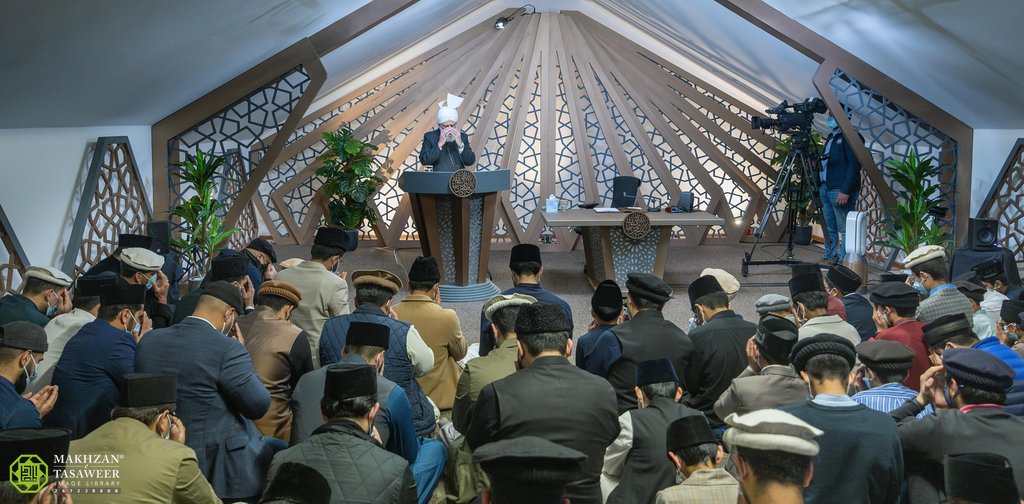
Hazrat Mirza Masroor Ahmad further stated:
“If your way of speaking, conduct, dealings, activities, and engagements are not in accordance with the commands of Allah, then there is no benefit to you being a Waqf-e-Nau. If, instead of increasing your religious knowledge or striving to excel in your secular education, you poison your mind by viewing immoral, indecent and violent content, then there is no benefit to you being a Waqf-e-Nau. If you are not sacrificing your time regularly for the Jamaat, there is no benefit to being a Waqf-e-Nau. If you do not treat your relatives with love and if you do not treat your colleagues, friends, and those you meet with kindness, there is no benefit to you being a Waqf-e-Nau. If you are not extending the highest morals and courtesy in all your interactions, then there is no benefit to you being a Waqf-e-Nau. And if you are arrogant and lack humility, then there is no benefit to being a Waqf-e-Nau.”
As His Holiness neared the conclusion of his addres, he urged Waqf-e-Nau members to reflect on their progress and the true essence of their pledge.
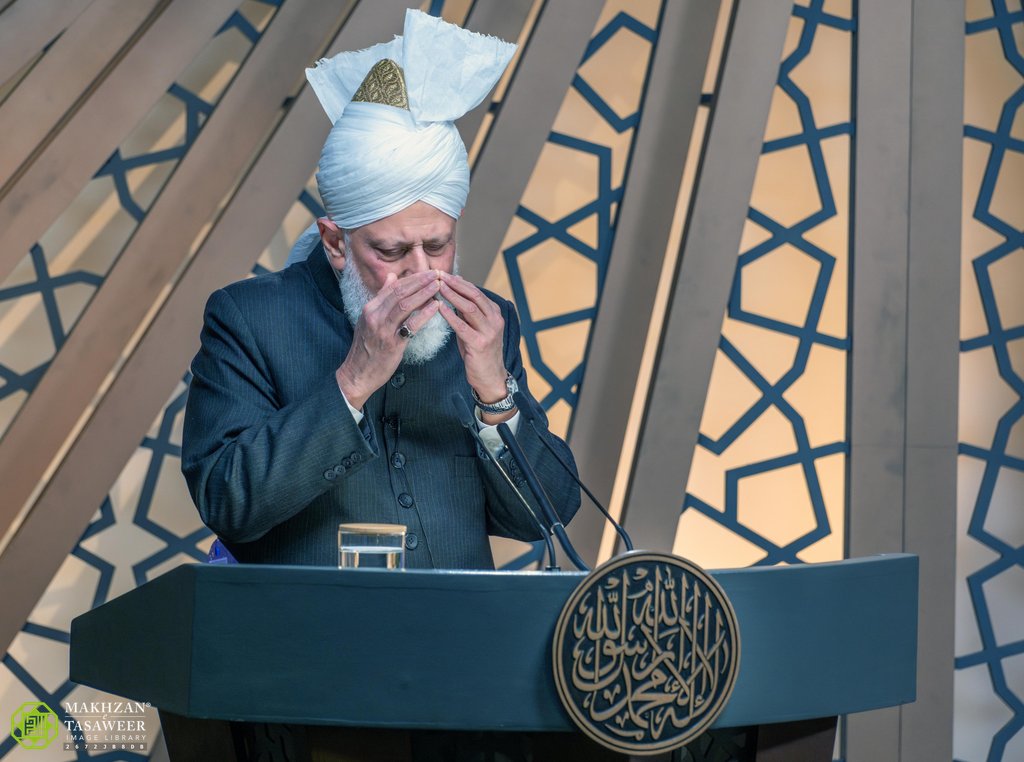
Hazrat Mirza Masroor Ahmad said:
“Most of you have reached an age of maturity and so every day you should hold yourselves to account. Assess to what extent you have fulfiled the demands of your Waqf (devotion to faith) and if you are progressing in your spiritual development. Analyse whether you have sought to improve your moral standards and religious knowledge. Only then can it be said that you are Waqf-e-Nau not just in name but in spirit and deed.”
The event concluded with a silent prayer, led by His Holiness.
